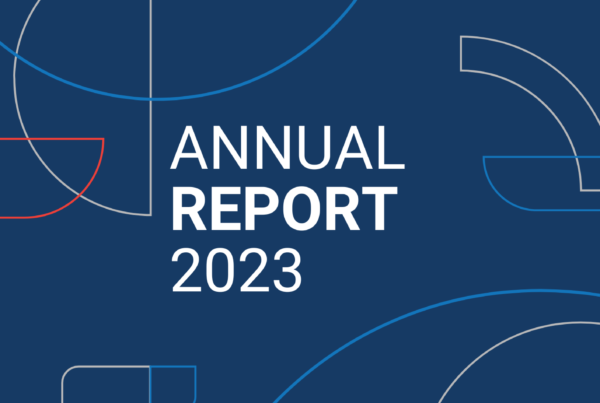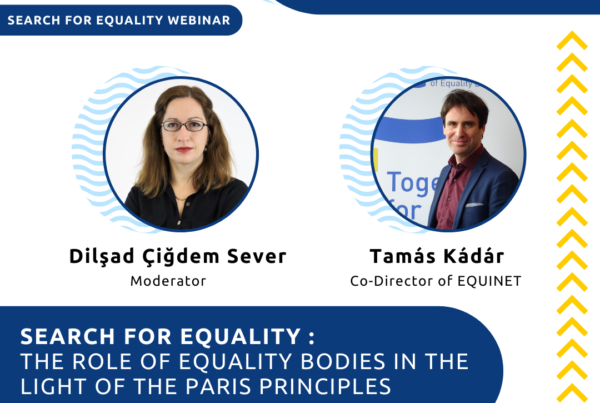Terms of Reference
Together against discrimination: building a civil society coalition to improve access to justice for victims of discrimination.
Introduction
The Netherlands Helsinki Committee (NHC) is a non-governmental organisation that promotes human rights and strengthens the rule of law and democracy in Europe. The NHC develops, seeks funding for and implements projects which in a practical and effective way build and strengthen the work of government institutions, NGOs and individual human rights defenders. The Association for Monitoring Equal Rights (AMER / ESHID) is a nongovernmental organisation based in Turkey. AMER engages in monitoring and advocacy to ensure that human rights and freedoms are ensured on a full and equal basis, with the aim of preventing all types of discrimination experienced in Turkey.
NHC and ESHID are looking for an expert to prepare an external evaluation of the EU funded project, Together against discrimination: Building a civil society coalition to improve access to justice for victims of discrimination. The project, which started in 01.01.2022, is running for 36 months.
Background of the project
The Association for Monitoring Equal Rights (AMER) and the Netherlands Helsinki Committee (NHC) are implementing the EU-funded project “Together against discrimination: Building a civil society coalition to improve access to justice for victims of discrimination” that aims to support and empower civil society in the protection and promotion of democracy, human rights and fundamental freedoms and thus contribute to the opening of civic, democratic and civil society space. The project focuses on improving the civil society response to discrimination as a key condition for the protection and promotion of human rights in Turkey. In particular, it aims to strengthen the capacity of rights-based organisations in complaint handling in discrimination cases, strategic litigation, engaging with the National Human Rights Institutions (NHRIs), and facilitating networking and coalition building. These enhanced capacities contribute to more resilient CSOs and to the opening of civic, democratic and civil society space in Turkey.
To contribute to the overall objective “to improve access to justice for people who experience discrimination in Turkey by strengthening civil society in addressing discrimination and advocating for more effective NHRIs in compliance with the Paris Principles,” the intervention logic is geared towards two main outcomes:
- Outcome 1: Strengthened capacity and network of civil society organisations, academia and bar associations in combatting discrimination.
- Outcome 2: Improved effectiveness of NHRIs in Turkey and cooperation with them through increased pressure from national and international advocacy coalitions to adhere to recommendations based on research and best practices from other European NHRIs.
In order to address the needs of victims in terms of awareness, support and information on how to seek their rights and turn to existing redress mechanisms, the project focuses on building the needed capacities of CSOs, as they have the potential to play an important facilitative role in access to justice for disadvantaged groups. This will be done through activities and training focused on monitoring, reporting, data collection, complaint handling, network building and awareness raising.
To facilitate international exchange of best practices, the project targets international civil society networks and networks of National Human Rights Institutions. These include the European Network for Human Rights Institutions, the Dutch Institution for Human Rights, and the NHC’s network of equality bodies in the Western Balkans. Via international conferences, the project aims to bring together NHRIs and other equality bodies from various countries in order to facilitate exchange of challenges and best practices. This opens the opportunity to discuss how cooperation between CSOs and NHRIs is embedded in different countries and gives CSOs and academics in Turkey a platform to share experiences, learn from and get introduced to other actors and their mechanisms. Via the participation of the Dutch Anti-Discrimination Bureaus in this project, a more concrete exchange in the format of training and coaching between The Netherlands and Turkey will be facilitated.
Activities include the following:
- Setting up the “Equality Watch Centre” which will be established by AMER and NHC and it will consist together with members of Turkish academia and bar associations;
- Establishing a stakeholder network;
- Further building specific capacities of rights-based organisations and lawyers in complaint handling, monitoring, reporting and working with NHRIs;
- Developing a guidebook on working with NHRIs;
- Sub-granting procedures for six (6) rights-based organisations;
- Disseminating project results through varied communication instruments;
- Facilitating international exchange through NHC’s international networks;
- Developing tools, analyses and reports on the functioning of the NHRIs;
- Supporting academic research on discrimination and the functioning of NHRI
For more information, please visit www.esitlikizlememerkezi.org
Objectives of the assignment and description of work responsibilities
An external evaluation for the project for learning and steering purposes by the end of the project period is part of the larger scope. The end of term evaluation will be geared towards generating insight into the project’s implementation and the achievement of results, whether intended or unintended. It will include questions regarding the OECD criteria of relevance, effectiveness, efficiency, sustainability, coherence and impact, as well as learning questions. In line with the gender mainstreaming in the project approach, the evaluation will include a gender perspective similar as explained under monitoring. The evaluation will develop recommendations resulting from the findings and conclusions that can help improve the current work in this field at the NHC and AMER. NHC will share the evaluation report with the EU as part of the final project report.
The external evaluation will provide the project team with information regarding two topics:
- To assess the implementation of the project in identified areas
- To make informed decisions about lessons learned during in the project.
In order to create ownership over the results of the final evaluation it is crucial that different actors involved in the project actively participate in the evaluation.
The Netherlands Helsinki Committee wishes to contract an external Monitoring & Evaluation (M&E) Expert to undertake the final evaluation of the “Together against discrimination: building a civil society coalition to improve access to justice for victims of discrimination.”
Travel
Interviews during the evaluation period might be held face-to-face or online, thus travel for experts may not be necessary.
Qualification and skills
- At least 5 years of experience related to research and/or monitoring and evaluation in national/international projects.
- Experience of working with donor-funded projects
- Experience of working with participatory methods/models
- Since the project activities are implemented in Turkey fluency in written and spoken English and Turkish is essential.
Duration and availability
| Phase | Description of Work Responsibilities | Deliverables | Deadline | Decision Points |
| Overall Objective | Conduct an external evaluation for the project for learning and steering purposes by the end of the project period. The evaluation will generate insights into the project’s implementation and the achievement of results, whether intended or unintended. It will include questions regarding the criteria of relevance, effectiveness, and sustainability, as well as learning questions. The evaluation will include a gender perspective as explained under monitoring. Recommendations will be developed to help improve current work at the NHC and AMER. NHC will share the evaluation report with the EU as part of the final project report. | Evaluation report in English. | End of Project Period | NHC will share the evaluation report with the EU. |
| Phase 1: Inception | Review project documentation, organise a session with the project team to discuss final evaluation setup and Key Evaluation Questions (KEQs). Obtain pre-meeting input from partners. | Online session/discussion on final evaluation setup Key Evaluation Questions Approved evaluation plan | September -October 2024 | Evaluation plan approved by Programme Officer. |
| Phase 2: Data Collection | Collect information through various activities as detailed in the evaluation plan, based on the final KEQs. | Updates to Programme Officer as necessary. | October -November 2024 | Regular updates provided to Programme Officer. |
| Phase 3: Analysis and Reporting | Identify framework and tools for analysis and visualisation. Discuss preliminary findings with project partners in a feedback session. Prepare a concise final evaluation report focusing on lessons learnt and recommendations. Ensure partner input and ownership of recommendations. | Feedback session Final evaluation report (including one round of consolidated review) | November-December 2024 | Preliminary findings discussed in feedback session. Final report submitted by 31 December 2024. |
Application process
Applicants are invited to submit
- Their CV including relevant examples of evaluation performed
- Workig methodology and approach
- Workplan (not to exceed 5 pages),
- Budget with the breakdown of the cost ( not to exceed 6000 Euro including taxes and all expenses )
by 15 September 2024 to Malini Laxminarayan, Programme Officer, at [email protected]. Any questions may also be directed to this email address.




